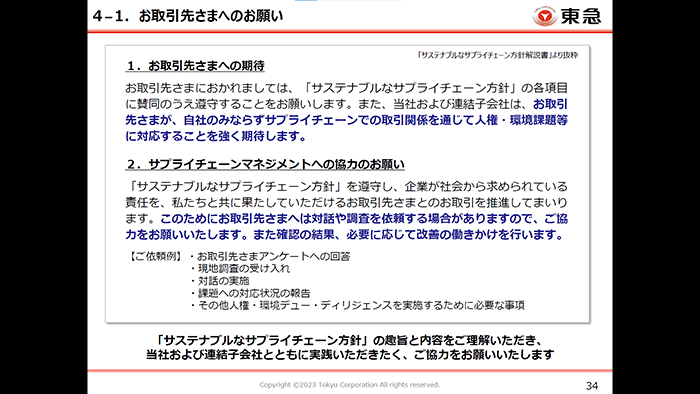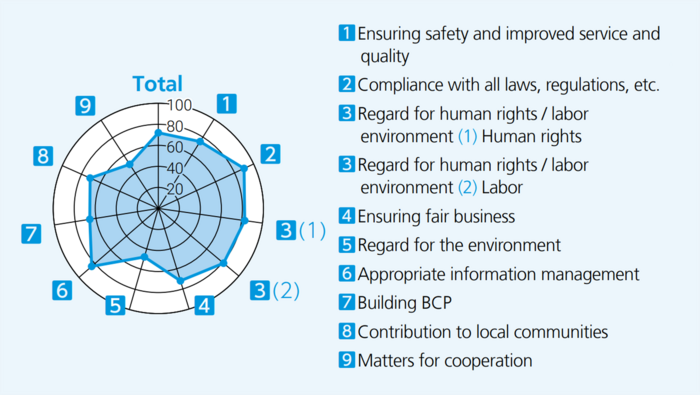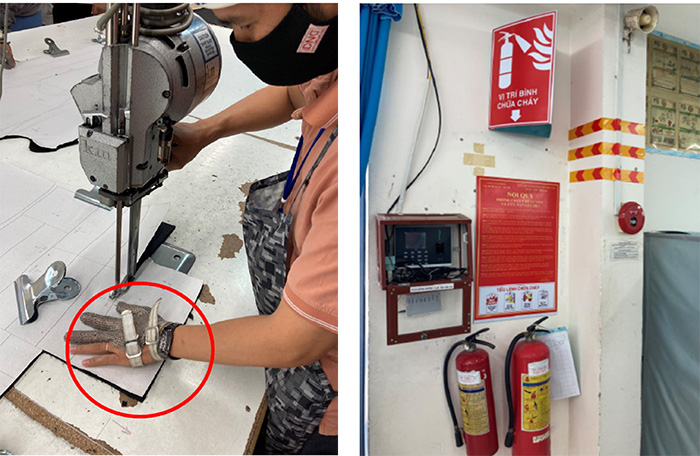The Company and its consolidated subsidiaries have been working to solve social issues through our business, focusing on Urban and community development based on railway. As we develop a wide range of businesses, we have built a diverse supply chain. As a responsible member of the global supply chain, we recognize that we are required to address human rights and environmental issues not only within our company but also in our supply chain. We have formulated a "Sustainable Supply Chain Policy" to share our thoughts on human rights and environmental issues with our business partners, recognize the environmental and social risks in the supply chain in all transactions, including raw material and product procurement, strive to understand the issues in the supply chain we are involved in through business activities, and engage in optimal business activities to realize a sustainable society.
The Company and its consolidated subsidiaries have adopted "Toward a beautiful age" as the Group slogan and share a Group mission statement: We shall strive to create beautiful living environments, in which each person can pursue individual happiness in a harmonious society.
Under this slogan and mission statement, the Company and its consolidated subsidiaries ensure that related laws, regulations and other requirements are observed, and that fair, equitable and transparent procedures are followed based on the principle of free competition in all business dealings including procurement activities in Japan and abroad. We also recognize the need to ensure quality, set optimum prices and adhere to delivery deadlines, as well as to consider issues such as human rights and the environment, while engaging in responsible activities that help create social value and economic value throughout the supply chain.
To work with the business partners in fulfilling responsibilities to create a sustainable society as demanded by society, in this policy the Company and its consolidated subsidiaries respect international norms including the ten principles in the four areas (human rights, labour, environment and anti-corruption) of the United Nations Global Compact of which the Company is a signatory, and have set forth the matters to be observed. The Company and its consolidated subsidiaries request that the business partners associated with its businesses, products and services understand the purpose and contents of this policy and cooperate with putting it into practice.
The policy applies to the entire supply chain including direct and indirect business partners associated with all products, services and raw materials procured by or supplied to the Company and its consolidated subsidiaries.
In accordance with the human rights policy, basic safety policy, anti-corruption policy and environmental policy established by the Company, we seek cooperation in understanding and implementing the following matters from the supply chain in all aspects of business transactions including the procurement of raw materials and products. Please refer to the following PDF file for specific items to be observed.
Sustainable Supply Chain Policy
| 1. Ensuring safety and improving services and quality | (1) Safety assurance |
|---|---|
| (2) Quality control and the creation of quality assurance systems | |
| (3) Disclosing necessary information concerning products and services | |
| 2. Compliance with various laws, regulations and other requirements | |
| 3. Respect for human rights and consideration for work environments | (1)Respect for human rights |
| ①Compliance with and respect for international standards on human rights and labor | |
| ②Prohibition of discrimination | |
| ③Prohibition of harassment | |
| ④Respect for local residents and communities | |
| ⑤Respect for the rights of socially vulnerable persons and minorities | |
| (2) Ensuring healthy, safe and comfortable work environments | |
| ①Freedom of association and collective bargaining rights | |
| ②Prohibition of forced or compulsory labor | |
| ③Prohibition of child labor | |
| ④Payment of wages equal to or above the minimum wage | |
| ⑤Prohibition of long working hours | |
| ⑥Workplace health and safety measures | |
| ⑦Preparation for emergency | |
| ⑧Prevention of occupational accidents, injury and illness | |
| ⑨Industrial hygiene measures | |
| ⑩Measures to address physically demanding work | |
| ⑪Ensuring sanitary facilities and appropriate environments for eating and living | |
| ⑫Protecting the rights of foreign nationals and migrant workers | |
| 4. Thoroughly ensuring fair trade | (1) Prevention of corrupt practices |
| (2) Exclusion of anti-social forces | |
| (3) Protection of intellectual property | |
| (4) Establishment of whistleblowing and consultation systems and prohibition of retaliatory behavior | |
| 5. Environmental considerations | (1) Responding to climate change |
| (2) Preservation of biodiversityBiodiversity | |
| (3) Prevention of pollution | |
| (4) Effective use of resources | |
| (5) Appropriate use of water | |
| (6) Appropriate utilization of forest resources | |
| 6. Appropriate information management | |
| 7. Development of BCP | |
| 8. Contributing to local communities |
Sustainability Promotion Committee, a subordinate body of the Management Meeting, plans, proposes and makes recommendations regarding basic management policies related to supply chain management, as well as business activities and corporate policies and strategies.
The activities of Sustainability Promotion Committee are appropriately supervised by the Board of Directors, and matters for discussion are regularly submitted to and reported on the Management Meeting and the Board of Directors.
| Chairperson, Sustainability Promotion Committee | Masahiro Horie (President & Representative Director, Chief Executive Officer) |
|---|---|
| Chief Sustainable Supply Chain Officer | Kazuyoshi Kashiwazaki (Managing Executive Officer) |
| Division Responsible for Promotion | ESG Promotion Group , Corporate Planning Division |
Please refer to the following link for details regarding the sustainability management promotion system and the activities of the Sustainability Promotion Committee.
We will promote business with business partners who will comply with the above policy and will work with us to fulfill the responsibilities that society expects of companies. In addition, for business partners with whom we have ongoing transactions, we will regularly check their compliance with the above policy and encourage them to make improvements as necessary.
In order to engage in optimal business activities toward the realization of a sustainable society, we revised our previous "Sustainable Procurement Policy" (established in 2006) into the "Sustainable Supply Chain Policy" in April 2023. With this revision, we have expanded the scope of application to the entire supply chain, including direct and indirect business partners involved in all products, services, and raw materials procured and provided in the business of the Company and its consolidated subsidiaries.
To deepen understanding of the purpose and content of Sustainable Supply Chain Policy and to implement it throughout the supply chain, we have created Sustainable Supply Chain Policy Guidelines , which explains each item of Sustainable Supply Chain Policy, related laws and regulations, and provides specific implementation guidelines.
In FY2023, we held an explanatory meeting to inform our business partners of the revised "Sustainable Supply Chain Policy" and to ensure their understanding and agreement with the Company and its consolidated subsidiaries.
In order to address social issues related to human rights and the environment in the supply chain, which have been gaining global attention in recent years, we focused on the sustainability initiatives of the Company and its consolidated subsidiaries, as well as our Sustainable Supply Chain Policy which was revised in April 2023.
Additionally, supply chain management personnel from the Company and its consolidated subsidiaries also attended the briefing and deepened their understanding of this initiative.

Online Seminar
In order to identify sustainability risks in the supply chain of the Company and its consolidated subsidiaries, and to take appropriate measures to prevent and mitigate them, we conduct questionnaire surveys of major business partners, aiming for sustainable growth together with our business partners.
In FY2023, we identified 93 major business partners of Tokyu Corporation and its consolidated subsidiaries based on their influence on our business (transaction amount, handling of specific commercial products, potential risks, etc.) in each of the four segments (transportation, real estate, life service, hotel and resort) and "others" for a total of five areas. We held a briefing session on Sustainable Supply Chain Policy for these business partners and sent them a questionnaire along the lines of Sustainable Supply Chain Policy. In addition to the responses, business partners were asked for their understanding and cooperation with this policy.
The survey conducted in FY2023 included the following 66 questions in line with Sustainable Supply Chain Policy.
| Question classification | Number of questions | |
|---|---|---|
| 1. Ensuring safety and improving services and quality | 7 questions | |
| 2. Compliance with various laws, regulations and other requirements | 1 question | |
| 3. Respect for human rights and consideration for work environments | 27 questions | |
| (1)Respect for human rights | 7 questions | |
| (2)Ensuring healthy, safe and comfortable work environments | 20 questions | |
| 4. Thoroughly ensuring fair trade | 5 questions | |
| 5. Environmental considerations | 15 questions | |
| 6. Appropriate information management | 3 questions | |
| 7. Development of BCP | 3 questions | |
| 8. Contributing to local communities | 1 question | |
| 9. Cooperation to Put the Compliance Items into Practice | 4 questions | |
| Total | 66 questions | |
The survey results show that the average scores for cooperation and environmental considerations are somewhat low, as shown in the figure below. With regard to cooperation, it was found that suppliers have yet to make any effort in their supply chains, and with regard to environmental considerations, it was found that there are issues with quantitatively grasping suppliers' efforts.
■ Number of companies surveyed: 95
■ Survey response rate: 86%

Response by domain as indicated by business partners survey results
From August 2024, we will start providing feedback on the results to transactions that responded to the survey, and we have had direct dialogue with some business partners. Through direct dialogue, we were able to deepen our understanding of each other's ideas, initiatives, and issues regarding human rights and governance, and it was a good opportunity for sustainable growth in the future.
In March 2024, we held a dialogue with external experts regarding our human rights and sustainable supply chain management initiatives.
For more details, please see the following page.
When ordering uniforms for Tokyu Railways employees, we conduct on-site audits of fabric factories and sewing factories. As a pre-audit check, in addition to quality control such as production management and inspection systems, we check the status of response to issues related to Respect for Human Rights, consideration for the working environment, and consideration for the environment. During the on-site audit, we check the absence of child labor, the status of labor management, the status of workplace safety and hygiene measures, and the establishment of evacuation routes in case of emergencies.
In FY2023, we conducted audits of sewing factories in Vietnam and Indonesia.

(Left) An employee of a business partner cuts fabric while wearing metal gloves to prevent injury.
(Right) Checking the availability of fire extinguishers and first aid supplies, and emergency evacuation routes
business partners of Sustainable Supply Chain Policy, hold explanatory meetings, and conduct surveys and provide feedback on the results. In addition, we will consider expanding our grievance mechanism to be in line with the Guiding Principles and create human rights awareness tools, aiming for sustainable growth together with business partners.
the Company and its consolidated subsidiaries use the "Sustainable Supply Chain Policy" as a criterion for selecting business partners, and will select business partners who comply with this policy, seeking their understanding of the policy and their cooperation in putting it into practice.
In July 2022, we held a sustainability seminar entitled "Business and Human Rights: What We Should Initiative to Seek New Corporate Value" to raise awareness of "Business and Human Rights" for our full-time officers and representative Director of consolidated subsidiaries.
We invited a guest speaker from the Caux Round Table Japan, a non-profit organization, to speak about "business and human rights," a topic that the Company and its consolidated subsidiaries should address. He spoke about "what must not be changed" and "what must change," based on global trends including the United Nations' "Guiding Principles on Business and Human Rights," as well as Group Philosophy and our company's DNA.
To further promote initiatives in the supply chain regarding the environment, human rights, and Corruption Prevention, we hold the "Tokyu Group ESG Promotion Seminar" for employees of the Company and its consolidated subsidiaries. By sharing the significance of initiatives in the supply chain and leading examples, we strive to raise and improve employee awareness.
| Month | Content | subject |
|---|---|---|
| February 2023 (Online) |
Tokyu Group ESG Promotion Seminar "The supply chain management required today" Ms. Makiko Akabane, CSR Asia Japan Representative | All consolidated employees (if desired) |
We conduct "compliance training" every year to learn about our "Code of Conduct" with concrete examples so that each employee can act with awareness and comply with laws, regulations, and regulations, as well as social demands such as ethics and environmental issues. During this training, we explain the ESG-related policies and statements of the Company and its consolidated subsidiaries, and also inform all employees of the "Sustainable Supply Chain Policy." The attendance rate in FY2023 was 100%.
Additionally, we have requested our consolidated subsidiaries to inform their employees of this policy at the time the policy is established and at the Group Sustainability Promotion Committee, and each consolidated subsidiary is making efforts to inform its employees via its intranet or other means.
We have set up an internal reporting system, which is located within the company and at a law firm, and which responds to reports and inquiries from employees of the Company and its consolidated subsidiaries (including business partners).
In addition, Tokyu Customer Center handles customer comments and inquiries.
Internal whistle-blowing system to address compliance issues